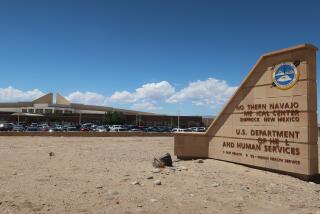Heart Patients With Help and Support Do Better
- Share via
People with heart disease have a better chance at long-term survival if they have substantial help and support from family or friends in performing daily tasks.
Canadian researchers surveyed more than 800 people in the months after a heart attack and again a year later. Those patients who initially felt they needed more help were 3.2 times more likely to have died during that year compared to patients who said they had adequate help and support. People who complained that they needed “much more help” were 6.5 times as likely to have died.
The kind of support heart disease patients require may include such things as help with bathing or taking medications, said the researchers, whose findings were published last week in the Journal of General Internal Medicine. Family or friends should simply inquire: “Are you getting the support you need?”
Depression in Many Seniors Goes Undiagnosed
Depression in people 65 and older is a major public health problem, according to a report in the Oct. 8 Journal of the American Medical Assn. The report, an update on a 1991 statement by the National Institutes of Health, suggests that better efforts are needed to diagnose and treat depression in later life.
According to researchers, from 1980 to 1992, suicide increased 9% in people 65 and older. The suicide rate among elderly white men 85 and older is six times the rate of the general population.
The authors point out that sleep disturbance is a key symptom of depression in the elderly, and that people who are physically ill and depressed are much more likely to become disabled. Despite the growing knowledge base, doctors have been slow to recognize and treat depression in this age group, the report states.
Overall, the authors write, “older people may benefit substantially from increased sensitivity to identification of depression on the part of their primary care physicians.”
Smaller Meals Are in Order as You Age
As you get older, consider eating smaller meals, say the authors of a study in the October issue of the American Journal of Clinical Nutrition.
The study compared how well women in their 20s burned fat compared with women in their 60s and 70s. The groups matched similarly when eating meals of 250 to 500 calories. But when consuming 1,000-calorie meals, the older women’s fat-burning process was about 30% lower. All the meals contained 35% of calories from fat.
Dietary fat that doesn’t get burned off is stored as fat.
This study, performed by the U.S. Department of Agriculture, is the first of its kind, and the results need to be confirmed. Nevertheless, the work may help explain why body fat typically doubles between the ages of 20 and 60. The researchers speculate that the less efficient fat burning is due to hormonal changes.
Patients Need to Be Told Tests Not Always Reliable
Doctors have a responsibility to inform patients of the limitations of screening tests--such as mammograms and prostate specific antigen tests--especially when the patient requests the test against the doctor’s advice.
If doctors do not believe the test is warranted, they should tell the patient so and explain why, say the authors of a report in the current issue of Archives of Family Medicine. The danger of consenting to every patient’s request is that patients may believe the tests are more effective than they really are or that having the test will reduce the risk of having or getting a disease. Moreover, financial resources simply demand prudent use of screening tests, say the authors of the paper, from the University of Michigan Medical Center.
“For most diseases for which there is a potential screening test, the effectiveness of screening is controversial,” they note.
Most doctors follow government or professional guidelines in determining when patients should undergo screening tests.






